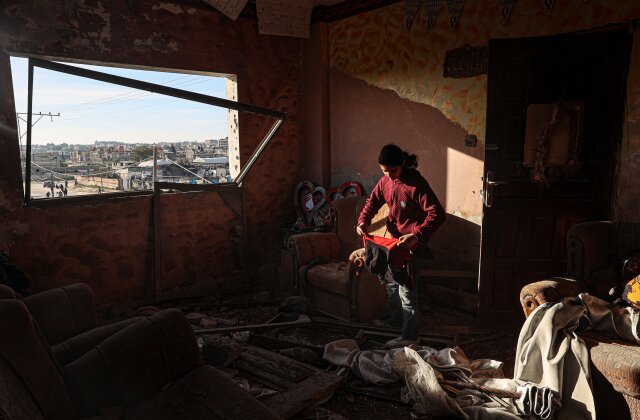[ad_1]
BRUSSELS (Reuters) – Iran is continuing to enrich uranium far beyond its requirements for commercial nuclear use despite U.N. pressure to stop, IAEA chief Rafael Grossi said on Monday. He said he wanted to visit Tehran next month for the first time in a year. “Flowing apart”.
Speaking to Reuters after briefing EU foreign ministers on the topic, the UN nuclear watchdog chief said that while the pace of uranium enrichment has slowed slightly since late last year, Iran still has about 7 kilograms. Proliferating at a high rate. 60% purity uranium per month.
war in israel and gaza

Enrichment to 60% brings uranium closer to weapons grade, and is not necessary for commercial use in nuclear power generation. Iran denies seeking nuclear weapons but no other state has prospered to that level without producing them.
Latest photos from Ukraine

Under a expired 2015 deal with world powers, Iran can only enrich uranium up to 3.67%. After then-President Donald Trump pulled the US out of that deal in 2018 and reimposed sanctions, Iran violated it and went well beyond the deal’s nuclear restrictions.
Photos you should see

Between June and November last year, Iran slowed enrichment to 3 kilograms a month, but returned to a rate of 9 kilograms at the end of the year, the watchdog, formerly known as the International Atomic Energy Agency (IAEA), said. Was known from. informed of.
The escalation came as Tehran blocked a third of the IAEA’s core inspection team, including the most experienced, from participating in the agreed monitoring of the enrichment process.
“This slowdown, acceleration thing is like a cycle that to me doesn’t change the fundamental trend, which is the trend of continued growth in highly enriched uranium inventories,” Grossi said.
A spokesman for the Atomic Energy Organization of Iran was not immediately available for comment.
The IAEA warned in late 2023 that Tehran already had enough material to make three nuclear bombs if it enriched the material beyond 60% to 60%.
“There is a worrisome rhetoric out there that you’ve heard recently from high officials in Iran saying that they have all the elements for a nuclear weapon,” Grossi said.
He referenced tensions over Israel’s war with Iran-backed Hamas in Gaza, saying concerns are high due to the current circumstances in the Middle East.
“It feels like we’re falling apart… Iran says they’re not getting encouragement from the West, but I find that argument very complicated to understand because they should be working with us… It should never be an economic Or should not depend on other incentives.”
Before traveling to Tehran, Grossi is scheduled to visit Moscow to meet with Russian President Vladimir Putin to discuss Ukraine as well as Iran and the Middle East.
Russia is a signatory to the 2015 agreement, known as the Joint Comprehensive Plan of Action (JCPOA), along with the US, China, France, Britain and Germany. The agreement lifted sanctions on Iran in exchange for restrictions on its nuclear activities.
He said, “Russia has to play a role on Iran. It has played a role in the past as a JCPOA country and in the current circumstances where the JCPOA has completely disintegrated, something has to fill this void.”
Grossi said he had seen a reduction in military operations around the Russian-held Zaporizhia nuclear power plant in Ukraine, Europe’s largest nuclear power plant.
Fears of a serious nuclear incident were high when Russian forces captured the facility in 2022 and again after the destruction of the Kakhovka dam last year.
“There has been no militarization, no deployment of heavy artillery,” he said, adding that nearby war zones and frequent blackouts remain a matter of concern.
“In the current situation, minimum staff is required to maintain the plant,” he said.
Grossi said minimum staffing was still met despite about 100 members refusing to sign a new contract with Russia’s Rosatom, which would have taken over operation of the idled plant in 2022.
The EU has so far held off on sanctioning Russia’s state-owned nuclear firm Rosatom or any of its subsidiaries, despite multiple calls to target that industry. Europe is still heavily dependent on Rosatom which supplies about 50% of the world’s enriched uranium.
Grossi said, “Many companies in the West depend on Russian supplies – enriched uranium or fuel –… Sanctioning Rosatom would not be realistic and is impractical. It would bring the nuclear industry to a standstill in many countries.”
Grossi said reducing Russia’s reliance on the nuclear sector would cost Europe billions of dollars, and he saw no immediate change. He said the bigger issue is infrastructure and incentives and the forecast of growing demand for uranium globally.
“Frankly, I see the presence of Russian uranium enrichment capabilities in the world increasing rather than decreasing,” he said.
(Reporting by Julia Payne, editing by William McLean)
Copyright 2024 Thomson Reuters,
[ad_2]
Source link
